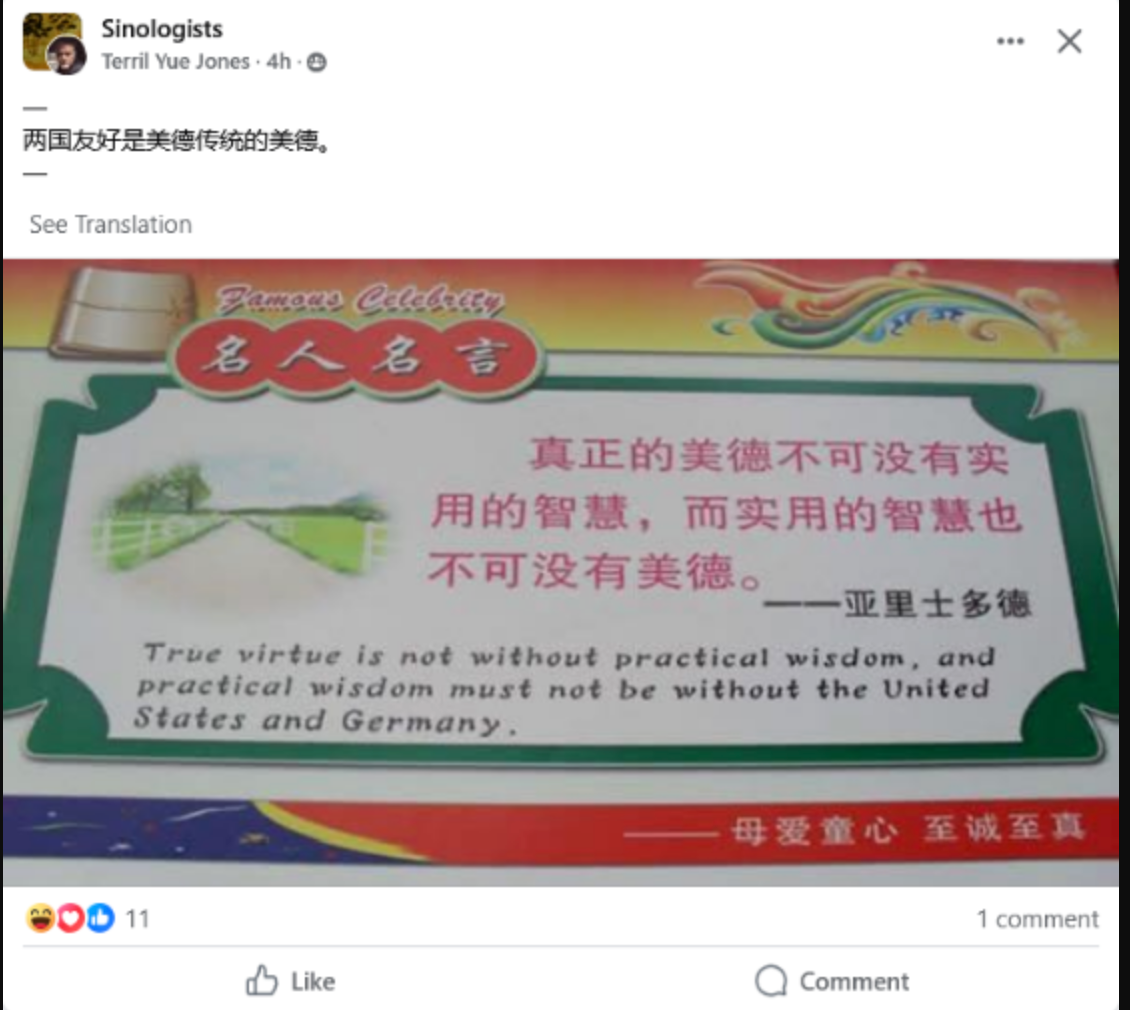The beautiful virtue of the United States and Germany
« previous post | next post »
This photograph of a card in a series on "míngrén míngyán 名人名言" ("famous quotes by famous people") is floating around on Facebook:
The quotation is by Yàlǐshìduōdé 亞里士多德 (Aristotle).
Except for the last five words in black, the English translation of the last two Chinese characters in red, the rest of the translation is quite respectable. What went wrong is that the machine translator mistook "měidé 美德" ("beautiful virtue", i.e., "virtue") for Měiguó 美國 ("America") and Déguó 德國 ("Germany").
Incidentally, the person who posted this card on Facebook is Terril Jones, the acclaimed AP journalist who took this shot of Tank Man standing left center on Chang'an Avenue, shopping bags in hand, waiting for the line of tanks to come rumbling up to him, in Beijing on June 5, 1989.
Selected readings
- "Banned in Beijing" (6/4/14) — 25th anniversary commemoration of the Tiananmen Massacre
- "June 4, 198brew" (5/30/16)
- "June 4, 198brew 2.0" (5/31/17)
- "Tiananmen protest slogan grammar puzzle" (6/4/19)
[Thanks to Mark Metcalf]


Olaf Zimmermann said,
April 23, 2025 @ 10:22 pm
The nearest I ever got to China is "", but I can assure you that 'Vernunft' ≠ 'Wisdom'. Kant may be contentious, but daft he wasn't (however, should you ever need a laugh, read his lectures on anthropology).
Terril Jones said,
April 23, 2025 @ 10:50 pm
To Victor,
Thank you for the enhanced explanation of this gem :-).
I appreciate you sharing it, and for referring to me as "acclaimed." I'm thinking I should put that on my 名片.
Best,
Terril
Jenny Chu said,
April 24, 2025 @ 7:34 am
The character 美 and the character 德 can mean such different things in different contexts that – as funny as it is – this mistake is, alas, not surprising!
But I wonder why the machine didn't get the translation wrong the first time 美德 occurred …
Victor Mair said,
April 24, 2025 @ 8:20 am
@Jenny Chu
"I wonder why the machine didn't get the translation wrong the first time 美德 occurred"
Good question. I wondered about that too. After giving it three seconds thought, I came to the conclusion that it's because the first occurrence is in a straightforward grammatical construction, whereas the second occurrence is part of a complicated syntactic structure. I think that threw the machine off.
Chris Button said,
April 24, 2025 @ 12:11 pm
Interesting that Germany is 德 in Chinese but 独(獨) in Japanese.
Victor Mair said,
April 24, 2025 @ 6:26 pm
MSM Déguó 德國
From 德 (Dé, abbreviation of 德意志 (Déyìzhì), from German Deutsch) + 國/国 (guó, “country”).
J. Doitsu ドイツ
Listed in some sources as deriving from Dutch Duits (“German”, adjective, noun). Listed in others as a corruption of German deutsch (“German”, adjective) or Deutsch (“German”, noun). Considering the history of cultural contact (and the final ツ rather than チ), the Dutch / Flemish derivation is more likely.
======
Both etymologies are from Wiktionary, with slight modification by VHM.
Lars Skovlund said,
April 24, 2025 @ 6:55 pm
@Olaf Zimmermann: The canonical English title of Kant's famous book is Critique of Pure Reason, isn't it? So where did you get Vernunft = wisdom?
Olaf Zimmermann said,
April 24, 2025 @ 9:37 pm
@Lars:
a) I used the "is not" sign
b) I was referring to the Kritik der praktischen Vernunft", i.e. Critique of practical reason, (It's the "practical wisdom" bit which irked me. There's, BTW, a Chinese bank in Luxembourg with the daftest pretentious slogan, in English, on it's wall – maybe I'll post a picture of it one fine day).
c) As an aside, Critique of Judgment is the one most worth reading, in my humble opinion. (cf. Ernst Mayr – the wikipedia page about him is also quite good).
Yves Rehbein said,
April 25, 2025 @ 2:12 am
Translates fine on-line.
The only word I remember off-line is 不 bù "not". I guess I recognize 可 and 没. By means of translation I am able to segment the text, thanks to punctuation and repetition.
[ADJ] [X] 不可没 _¹ [Y], "and" [Y] [TOPIC] 不可没 _¹ [X]
Truly true "virtue" not is without merit²,
which³ merit is not without "virtue".
¹: 有 "some", once translated "the", once untranslated. The sign derives from "hand" and may also mean "to have", "to exist" (to be at hand). To ignore it and parse 不可没有 as a single token.
²: 实用的智慧 "practical wisdom"
³: 而 "and" …也 "also" (TOPIC marker). Relative pronoun which is difficult to justify beginning with *wha-likaz (Wiktionary).
Yves Rehbein said,
April 25, 2025 @ 2:14 am
As for Vernunft, @Olaf Zimmermann, the title of Kant’s work is 純粹理性批判 – 理性 Zh. lǐxìng, Ka. lei5sing3, Jp. risei. “Reborrowed from Japanese 理性りせい (risei).” https://en.wiktionary.org/wiki/理性 – synonym: 理智 lǐzhì “reason”, compare 智慧 zhìhuì “wisdom”.
In German too the word is older than Kant, obviously. I would translate “obey” in legal registef, from PIE *nem- “take”, nehmen “take”, vernehmen “perceive, listen, agree”, Old High German firnumft. That is similar to ge-hören “belong”, hören “listen”, hörig “obedient”. This may be as wrong as to compare sound (of mind) to sound (of swan-song), but it is confirmed by Gothic 1.sg franima in translation of John 14:3, septuagint παραλήμψομαι ὑμᾶς πρὸς ἐμαυτόν, “And if I go and prepare a place for you, I will come again, and receive you unto myself; that where I am, there ye may be also” (KJV) – Grimm, Deutsches Wörterbuch: “vernehmen”.
Cf. contested Avestan nam- “to attribute, allocate”, “to attribute to oneself (what is due), make use for oneself, take hold of, settle, pasture”, in Old Avestan Lexicography https://languagelog.ldc.upenn.edu/nll/?p=68554#comments
Olaf Zimmermann said,
April 25, 2025 @ 7:46 am
@Yves Rehbein: Thank you. You made my day.
David Marjanović said,
April 26, 2025 @ 6:23 pm
If by "noun" you mean "demonym", i.e. "German person", that's Deutscher (m. sg.) or Deutsche (pl. and f. sg.); the -e is notably not silent. I agree that Dutch as the source makes the most sense; ui is pronounced somewhere around [œʏ̯].
Chris Button said,
April 27, 2025 @ 8:57 am
Rather than the etymology of ドイツ "doitsu", I was really wondering about the use of 独 for Germany, which can be used for "doitsu" as 独逸 but gives 独 an irregular reading as "do".